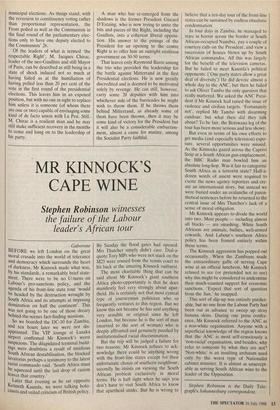MR KINNOCK'S CAPE WINE
Stephen Robinson witnesses
the failure of the Labour leader's African tour
Gaborone BEFORE we left London on the great moral crusade into the world of tolerance and democracy which surrounds the heart of darkness, Mr Kinnock made what was, by his standards, a remarkably brief state- ment. There were 'to be no U-turns on Labour's pro-sanctions policy, and the agenda of his front-line state tour 'would be headed by the destruction wrought by South Africa and its attempts at imposing domination on half the continent'. This was not going to be one of those dreary behind-the-scenes fact-finding missions. So we boarded the DC-10 for Zambia, and ten hours later we were not dis- appointed. The VIP lounge at Lusaka airport confirmed Mr Kinnock's worst suspicions. The dilapidated terminal build- trigs were doubtless a result of insidious South African destabilisation, the blocked lavatories perhaps a testimony to the latest racist commando raid. 'South Africa must be squeezed until the last drop of racism leaves that country.'
Later that evening as he sat opposite Kenneth Kaunda, we were talking holo- causts and veiled criticism of British policy.
By Sunday the flood gates had opened. Mrs Thatcher simply didn't care. Dial-a- quote Tory MPs who were not stuck on the M25 were roused from the tennis court to hit back at the amazing Kinnock outburst.
The most charitable thing that can be said about Mr Kinnock's giant southern Africa photo-opportunity is that he does manifestly feel very strongly about apar- theid. He is certainly not that most cynical type of journeyman politician who so frequently ventures to this region. But we know this not because he has said anything very sensible or original since he left London, but because he is the sort of man (married to the sort of woman) who is deeply affronted and genuinely puzzled by institutionalised racial discrimination.
But the trip will be judged a failure for two reasons: Mr Kinnock refuses to ack- nowledge there could be anything wrong with the front-line states except for their unfortunate choice of southern neighbour; secondly he insists on viewing the South African problem exclusively in moral terms. He is half right when he says you don't have to visit South Africa to know that apartheid stinks. But he is wrong to believe that a ten-day tour of the front-line states can be sustained by endless ritualistic condemnation.
In four days in Zambia, he managed to stare in horror across the border at South African-occupied Namibia, pay a couple of courtesy calls on the President, and view a succession of houses blown up by South African commandos. All this was largely for the benefit of the television cameras. But he failed to meet Kaunda's political opponents: ('One party states allow a great deal of diversity:) He did devote almost a whole day to the ANC, but then he failed to ask Oliver Tambo the only question that really mattered. We asked the ANC Presi- dent if Mr Kinnock had raised the issue of violence and civilian targets. 'Fortunately
not', replied Mr Tambo with disarming candour: but what then did they talk about? To be fair, the Botswana leg of the tour has been more serious and less showy.
But even in terms of his own efforts to get media (and especially television) expo- sure, several opportunities were missed.
As the Kinnocks gazed across the Caprivi Strip at a South African gun emplacement, the BBC Radio man bowled him an absolute long-hop. Was it fair to categorise South Africa as a terrorist state? Half-a- dozen words of assent were required to excite the news agency reporters and cre- ate an international story, but instead we were buried under an avalanche of paren- thetical sentences before he returned to the central issue of Mrs Thatcher's lack of a sense of moral obligation.
Mr Kinnock appears to divide the world into two. Most people — including almost all blacks — are smashing. White South Africans are animals, bullies, well-armed cowards. And Labour's southern Africa policy has been framed entirely within these terms.
The Kinnock aggression has popped out occasionally. When the Zambians made the extraordinary gaffe of serving Cape wine at an official luncheon, Mr Kinnock refused to see (or pretended not to see)
why this might be considered to undermine their much-vaunted support for economic sanctions. 'Expect that sort of question from the Sun,' he snapped.
This sort of slip-up was entirely predict- able, but no one from the Labour Party had been out in advance to sweep up stray banana skins. During one press confer- ence, Mr Kinnock referred to the ANC as a non-white organisation. Anyone with a superficial knowledge of the region knows that the ANC is most self-consciously a 'non-racial' organisation, and besides, why refer to someone by what they are not? 'Non-white' is an insulting archaism used only by the worst type of Nationalist cabinet minister. It is almost as unaccept- able as serving South African wine to the leader of the Opposition.
Stephen Robinson is the Daily Tele- graph's Johannesburg correspondent.


















































 Previous page
Previous page